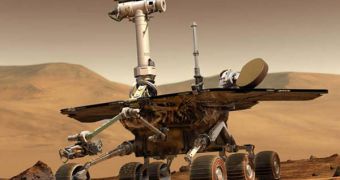If the Martian rovers could be compared to live scientists, then you could safely say that they are the founding fathers of a new scientific field, and that is robotic planetary exploration. Admittedly, they are not the first machines to have been sent to another planet, and they will most certainly not be the last ones, but since they have outlived their expected mission duration 20 times over, we can assume that they have taught their handling teams how to be good at what they do.
Spirit and Opportunity each face their own problems. Opportunity is just slightly damaged, with a broken wire hampering with the correct operation of its robotic arm. However, it is located in areas where Martian winds blow to a certain extent, so at least it benefits from clean solar panels, which supply it with sufficient amounts of energy to keep it going.
On the other hand, Spirit is not that fortunate. The tiny robot has suffered a lot during it's five years of scouting the Red Planet. For one, it has had to navigate the most treacherous terrains of the two, with loose gravels and sand that have often hindered its movements. In addition, the absence of winds has meant that its solar panels have become covered with dust. Also, one of its wheels has become stuck, so the resilient machine is now forced to travel backwards towards its targets.
Despite all these hardships, the exploration team has been able to endure 4 Martian winters, even though they were not specifically designed to withstand even one. As more and more time has passed over the 90-day original mission limit, scientists operating the pair have learned valuable lessons of how to navigate, command, steer, stop and maintain robots located millions of miles away, on another planet, while at the same time compensating for the 10-minute lag in communication.
“We have no way of knowing what the future holds for the rovers at this point. The mission could easily end tomorrow, but the miracle could continue. Spirit and Opportunity helped invent a whole new discipline – robotic field science. They've taught us how to organize a team of scientists and engineers to operate robotic rovers on a distant planet. We all had to learn to work together effectively year after year to squeeze the most possible science from the rovers,” Cornell University researcher Steve Squyres, who is the principal investigator of the Mars Exploration Rover mission, told Space in an e-mail.
“We've got an enormous amount of functional redundancy built into these vehicles. So a lot can go wrong and still allow us to do good science. If nothing mechanical stops us, then sooner or later the capacity of the batteries will degrade to the point where they no longer can hold enough charge. But we don't know how long that will take either. If we lose mobility completely, then yes, we can poke around at the place where we stop. But if the scenery isn't changing, sooner or later you reach a point of diminishing returns,” he concluded.

 14 DAY TRIAL //
14 DAY TRIAL //